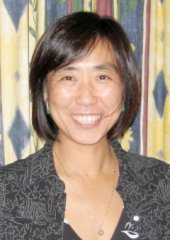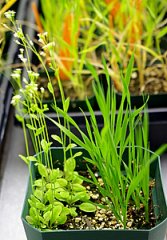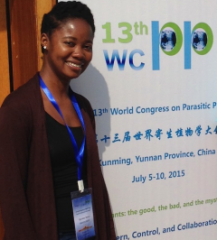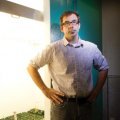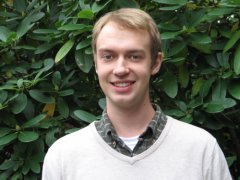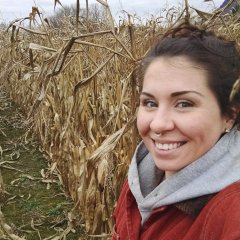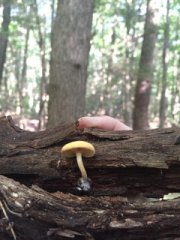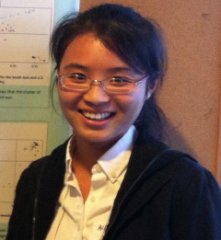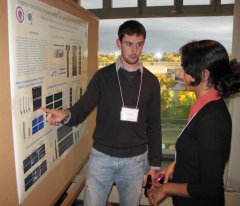News & Announcements
Li-Jun Ma named a Burroughs Wellcome Fund Investigator
Li-Jun Ma named a Burroughs Wellcome Fund Investigator
Li-Jun Ma, a University of Massachusetts Amherst biochemist and genomics expert, has received a coveted five-year, $500,000 Burroughs Wellcome Fund Investigator in the Pathogenesis of Infectious Disease award to develop new treatment options for opportunistic fungal infections. The Ma lab studies the genetic mechanisms that underlie the aggressive pathogenicity and genome evolution at the fungus-human interface in the model fungus Fusarium oxysporum. Ma and her colleagues will combine experimental and computational approaches to investigate pathogen virulence and host defense at the same time. Because of the huge amounts of data involved, she says, this project will use the advanced computing capabilities at the Massachusetts Green High Performance Computing Center in Holyoke. Read the full UMass News article here.
Hazen and Harrington receive two grants to develop crop biotechnology venture
Hazen and Harrington receive two grants to develop crop biotechnology venture
Plant growth is in part determined by a network of genes that influence total biomass yield. By studying the regulatory mechanisms of how plants build themselves, the Hazen Laboratory has identified ways to potentially boost energy crop yield. Professor Samuel Hazen and Postdoctoral Fellow Michael J. Harrington have been awarded grants from the National Science Foundation and the Massachusetts Clean Energy Center (MassCEC). The NSF Innovation Corp program award of $50,000 is designed to extend the basic laboratory research to entrepreneurial ventures. By participating in this program they will explore product opportunities and a business development plan. The MassCEC provided a $40,000 catalyst award to test what they have learned in their laboratory model, the small grass Brachypodium distachyon, in energy crop species.
Muvari Tjiurutue receives 2nd year of funding from the "Faculty for the Future" award, Schlumberger Foundation
Muvari Tjiurutue receives 2nd year of funding from the "Faculty for the Future" award, Schlumberger Foundation
Muvari Tjiurutue's Faculty for the Future award was recently renewed for a second year. The generous fellowship from the Schlumberger Foundation, is providing full funding for Muvari's research in the Adler Lab as well as funds for travel. This summer, Muvari went to Kunming, China to present her work at the 13th World Congress on Parasitic Plants (WCPP) conference. She presented her work on how gypsy moth (Lymantria dispar, L.) damage on cranberry hosts (Vaccinium macrocarporn) affected future dodder (Cuscuta spp.) parasitism on the same cranberry hosts. She found that gypsy moth damage delayed dodder parasitism and also delayed future dodder attachment possibly due to changes in phenolic acid defenses. She noted it was very exciting to present her work with professionals who share her passion for parasitic plants and she felt privileged to rub shoulders with some of the pioneers in the field. Muvari also presented her research at the Ecological Society of America (ESA) conference in Baltimore, MD in August.
Hazen selected as 2015 Whiting Fellow
Hazen selected as 2015 Whiting Fellow
Samuel Hazen, Biology, has received a grant from the Marion and Jasper Whiting Foundation. The award will support sabbatical research in France next year, on using phenomics as a teaching and research tool to understand how energy crops grow.
PB grad student Josh Coomey headed to France this spring.
PB grad student Josh Coomey headed to France this spring.
Josh Coomey, fourth year PhD graduate student in the Hazen Lab, has been awarded a Chateaubriand Fellowship to conduct research at the Institute Jean-Pierre Bourgin in Versailles, France. He will work with collaborators Richard Sibout and Grégory Mouille to characterize the regulation of plant cell wall growth. Ça C'est Bon!
SARE award to PhD grad student Sam Glaze-Corcoran
SARE award to PhD grad student Sam Glaze-Corcoran
Samantha Glaze-Corcoran, PB PhD student in the lab of Dr. Masoud Hashemi, Stockbridge School of Agriculture, was recently awarded a $15K SARE Graduate Student Grant. Her research project is entitled “Dual purpose cover crops for grazing season extension, nematode management, and improved resiliency on dairy farms”.
SMUTS! New Mycology Club
SMUTS! New Mycology Club
PB Graduate students Kathryn Vescio and Kelly Allen and their faculty sponsor Rob Wick have co-founded a new GSO club on campus focused on exploring and sharing information on the fungi growing in our area. The new club, S.M.U.T.S. (Society of Mycology at UMass for Teachers and Students), has been joined by Sam Glaze-Corcoran, Caroline Wise, Greg DeIulio, and Elisha Allan-Perkins, as well as UMass alumni, and is welcoming new members! If you are interested in helping to plan or joining in on mushrooms forays, fungal trivia nights, fungal inspired crafts (like spore prints), or just learning more about the fascinating world of fungi, please feel free to come to our next general body meeting on Tuesday, December 1st at 5 pm in the Paige Laboratory Conference Room, or contact Greg (gdeiulio@cns.umass.edu) to be added to our mailing list.
We have a few mycology inspired events coming up this fall that are open to everyone! On November 17th from 4:30-6, Dianna Smith of the Pioneer Valley Mycology Association will be giving a seminar on “100+ Edible Fungi and Their Poisonous Lookalikes (The Astute Amateur Mycologist Doesn't Play Russian Roulette)” in the Paige Conference room 202. On December 8th we will be giving a mini-microscopy lesson and looking at microscopic fungi in Fernald Hall. We hope to see you there!
Zhongyun Huang's recent travels to Europe and South America
Zhongyun Huang's recent travels to Europe and South America
Zhongyun Huang, PhD student in the Caicedo Lab, traveled to Austria this past July to participate in the Society of Molecular Biology and Evolution (SMBE) conference in Vienna. The SMBE conference is an annual meeting for evolutionary biologists and molecular biologists who use various model systems to investigate different aspects of evolution. She presented a poster "Parallel Evolution of Weedy Rice Traits". At the conference, she was particularly interested in bioinformatics and said she found exactly the right group of scientists to talk with, and they all gave her very good examples of how to apply bioinformatics in evolutionary studies.
Zhongyun also went on a field collection trip in Colombia with colleagues from Universidad Nacional de Colombia in November 2014. She helped local colleagues collect diverse weedy rice accessions for further molecular and genetics analysis. The field research was supported by an NSF grant from the Caicedo Lab focusing on the weedy red rice infestation problem in South America. During the trip, she met with a lot of local farmers in their family owned fields, and even though she could not speak Spanish, she could clearly feel that the farmers were extremely happy to know researchers are working to help them save their rice plants from weedy infestation. She said, "It was the moment I realized my study is not only limited to benches and computers, it is going to help a lot of people!"
How to choose a postdoc in Switzerland
How to choose a postdoc in Switzerland
Peter van Gisbergen, PhD in the Bezanilla Lab, writes about his recent experience choosing between three postdoc offers. "The next step. You know it is coming, but when it is there, it catches you by surprise anyway. Suddenly, questions start popping up in your mind; academics or industry, the USA or somewhere else? For foreign students, back to my home country or staying here? What about future opportunities? Significant others? Salaries? You would almost forget about the most important question of all: where can I work on a problem that captivates me and that I can sink my teeth in for at least a couple of years?
I faced these questions recently. For me it was clear academics was the way to go, as I’ve wanted to pursue that path since I was a teenager. No 9 to 5 job, no discoveries to help humanity, but doing research for my own personal interests. The other questions were harder to answer. I applied to the three labs whose research I like best based on the papers I read in journal club. I also met all the PIs at a conference. They did not have job ads out so I just sent an open application, but got an interview and later also an offer for all three. That is when the above mentioned questions needed answering. Two of the labs were in the U.S., one in Switzerland. The U.S. labs use techniques I would like to learn, while the Swiss lab has the more interesting biological question. Staying in the U.S. means better job opportunities later on, but going to Switzerland means being closer to family (same time zone at least) and a better salary. Staying in the U.S. means an easier move and transition whereas moving to Switzerland has better prospects for my wife.
I chose the option that was the overall best in terms of living conditions, chances for my wife and I, and the most interesting problem. There was one clear answer; we’re going to Switzerland! I will be working on fission yeast reproduction, no longer on plants. Yeast mating requires two cells to grow a structure towards each other (called a shmoo) in a pheromone-guided way. Then, the two cells need to fuse, which requires them to basically make a hole in themselves, for which the cytoskeleton is necessary as well as my favorite protein family: formins. The cells are under a high turgor pressure though, and if they do not do this at exactly the same time, at exactly the same place, they will basically blow up. How two very basic cells can successfully accomplish this almost 100% of the time fascinates me. The fact that the Martin lab at the University of Lausanne looks out over Lake Geneva and snow covered Alps didn’t negatively affect the decision either. Life is not all work."
PB alumni updates
PB alumni updates
New academic positions for our PB alums: Nicole Soper Gorden (PhD 2013) started this fall as a member of the Natural Sciences Faculty at Mars Hill University in North Carolina, as an Assistant Professor of Biology/Botany; Carrie Thurber (PhD 2012) is in her second year as an Assistant Professor in the School of Science and Mathematics at Abraham Baldwin Agricultural College in Georgia; Sydne Record (PhD 2010) is an Assistant Professor in Biology at Bryn Mawr College; Shuang Wu (PhD 2010) is a professor, Horticulture Plant Biology and Metabolomics Center at Fujian Agriculture and Forestry University in China.
